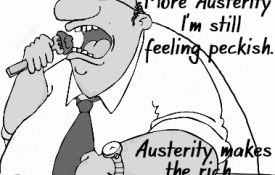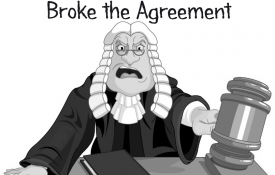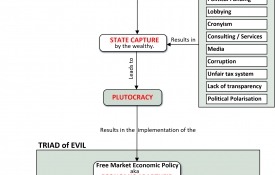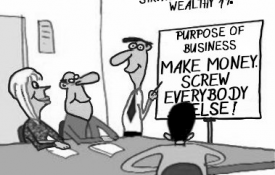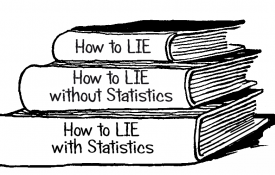Categories
Archive
-
- Economy
- by Adrian Mark Dore
- 25-02-2023
0.00 of 0 votesAt the dawn of the Dark Age, when Thatcherism and Reaganomics were introduced, a new form of feudalism emerged. It established a new ruling class - the mega-rich, who preside over us today. The distinguishing feature of this new era is that nothing appears to be what it is. It's all a massive lie. We are fed a continuous stream of bullshit, so the ruling class may continue to extract inordinate wealth from the rest of us while leaving us feeling that everything is just fine when it's not. Misleading claims are made that we live in a democracy, are much better off than our forefathers, and that our planet is not dying. Sadly, we believe them, allowing them to continue their thieving practices as the feudal masters of yesteryear did. The only way this tiny minority can control the rest of us, other than by force, is to lie and mislead us. The extent to which we are lied to and misled is breathtaking. It covers virtually every facet of life. In this article, I raise one aspect - Austerity, or Spending Cuts. It's pertinent because government deficits have soared after the COVID pandemic and cost-of-living crisis. What will follow is a lie similar to this. "As prudent keepers of the public purse, we are left with no realistic alternative other than to look at making deep cuts to government spending." This is a monstrous lie, but to get away with it, they make it sound reasonable by comparing government and household budgets. They have us believe that governments and individuals face similar budgetary restraints. This is simply untrue. As individuals, our incomes are fixed. To keep out of trouble, our only option is to cut costs. They imply that governments are in the same boat. Therefore, cutting costs is fair, reasonable, and the only realistic option. However, this analogy is incorrect because a government’s income is not fixed like an individual’s. Their options for addressing a deficit are far greater. Cost-cutting is only one of many options. Much better options are open to them, assuming they are working in our interests. As they are not, they will follow a cost-cutting exercise despite its adverse effects on us all, which I explain below, but first… How does cost-cutting benefit the rich? Cost cutting reduces the size of government. That is precisely what the rich want. They want a government with a small tax base. Less tax for them to pay. A small government also leads to fewer regulations and poorer government oversight. This provides greater opportunity to avoid or evade tax as small governments are less efficient at tax collection. The same applies to all departments. They are less efficient at their assigned duties. Thus, opportunities abound, which the morally defunct exploit. They also encourage governments to privatise public services to "help reduce expenditure." These ventures provide rich pickings. So, the more the government cuts costs, the wealthier the rich become. The stronger their political power. Their stranglehold on us increases. We become poorer and weaker. How does cost-cutting harm the majority? A small government means they offer fewer services or services of a poorer standard to the majority. These services span all aspects of life. When these services are cut, or the quality declines, the quality-of-life for the majority fall. See my article "Quality-of-life in freefall. The measure the rich don't want you to see" for more details. The less the state supports and provides for its citizens, the greater the cost to its citizens. They either have to provide the service themselves or forgo it. Either way, it's a cost to them. This lowers their quality-of-life. As mentioned earlier, a small government means less government oversight and control. This situation is taken advantage of and involves a plethora of activities, from tax evasion (by the wealthy) worsening working conditions, and harmful environmental practices. It means fewer and less effective protections afforded us and the environment from the avarice of a few. Cost cutting reduces our investment in the "commons." The "commons" represent our infrastructure and institutions, which we share and rely upon to live our lives. The greater the investment in the "commons", the stronger our economy. Investment in "commons" is what distinguishes developed and developing nations. Developing nations' investment in "commons" is not as substantial. Things we may take for granted, like reliable power supply, communications, road and rail infrastructure, and a functioning judiciary and policing service, may not exist in some developing countries. Businesses benefit from the "commons" but are reluctant to maintain and build it, despite its importance to our economy. There is a simple fact that I'm sure few will deny. Economies are stronger when middle /lower income groups are strong. Cost cutting, as explained above, weakens them. So, by making them poorer and reducing our investment in "common" assets, we are harming the economy's medium to long-term prospects. The rich are shooting themselves in the foot through government cost-cutting. If cost-cutting is not the best solution… How does the government reduce its deficit? Assuming we had a truly democratic government dedicated to looking after the majority's interests, then cost-cutting should be its least favoured option. It should look at options for increasing its revenues, which it can do through the following. Increase revenues through increasing corporate and high-end tax rates. Applying special taxes to all rental incomes and imposing import duties on certain goods to raise funds to stimulate local manufacturing. Stimulate growth by investing directly in the economy through infrastructure projects, key strategic businesses, and R&D (Research & Development) projects. Second, invest in social support. Money invested in social support is recycled back into the economy quickly, thus providing what is commonly referred to as an "economic stabiliser." The more spent on social support, the more stable the economy becomes. That's why a BUI (Basic Universal Income) would result in a stable economy, as the economy would be guaranteed a minimum monetary flow irrespective of other factors. Third, encourage and support the return of manufacturing to create a larger, more productive economy. Despite cost-cutting being the least attractive option, our plutocratic government will continue to serve their masters. They will ignore the needs of the majority because their masters will lose over the short to medium term. You may read other articles by Adrian Dore on Medium at https://medium.com/@adrianmarkdore/
-
0 Free market policies - the broken agreement.
- Economy
- by Adrian Mark Dore
- 24-02-2023
0.00 of 0 votesFree market economic policies (or neoliberal policies) have not delivered prosperity for the majority as promised. Instead, it has impoverished us while also causing extensive environmental damage. It is responsible for creating economic apartheid, where the needs of a small minority are served to the exclusion of the majority. We have lived with this poor economic policy for over four decades. It's time we replaced it with a policy which will better serve society and the environment. The easiest way to explain how an economic policy works is to think of it as an agreement between the two major players in our economy: Society and Markets. Markets are represented by shareholders (owners of businesses, the wealthy) and the government, representing Society and the country's natural resources. The Agreement The agreement calls upon both parties to perform certain acts. The agreed-upon economic policy describes these acts. The free market agreement (or policy) calls on the government to: - Reduce taxes on businesses and the wealthy. Apply fewer regulations and restrictions on business. Shareholders agree to the following: - Invest their profits back into the economy, thus increasing the productive economic base of the country. In the absence of government oversight (due to reduced regulations and restrictions), business is to act morally and responsibly in protecting the interests of society and the environment. Despite this simplification, it clearly illustrates the commitments made by both parties to serve the majority. No matter the policy chosen by the government, the objective should always be to serve majority needs, as that’s the responsibility of a democratic government. Outcome (Government) The government has over-delivered on their commitment, proving that we are not a democracy but a plutocracy (where the wealthy dictate economic policy.) The government has: - Drastically reduced taxes on businesses and the wealthy. Removed unfavourable business regulations. Applied favourable business regulations. Removed unfavourable business protections. Applied favourable business protections. Introduced subsidies and tax breaks. Points 2 to 6 represent free market hypocrisy. Free markets claim not to like regulations, protectionism, or unfair business practices such as subsidies and tax breaks. However, these dislikes are ignored when they benefit them. This is hypocrisy on a mega scale. In reality, our plutocratic government should not be allowed to sign a free market economic agreement, as they have a vested interest in supporting it. Under normal circumstances, this would be a fraud in the real world, as they have entered an agreement without declaring their vested interest. This should have precluded them from proceeding. Thus, the government themselves are acting fraudulently in supporting free markets. Outcomes (Shareholders) Shareholders have breached the agreement as they have not delivered on any of their commitments by: - Not reinvesting in our productive economy but instead investing heavily in the unproductive rentier economy, to the direct disadvantage of the majority. Not met their commitment to protect both society and the environment. Instead, they have used poor government oversight to abuse society and the environment in extracting wealth. The reality is they had no intention or ability to meet any of their commitments under this agreement. When you enter an agreement with the full knowledge that you are unwilling or unable to meet its terms, that is fraud. Read my article “Vacuum Up the reality. Trickle Down the lie.” to understand how the wealthy had little intention of investing in the real productive economy from the start. They use free market policies to weaken the majority and the rentier economy to exploit these vulnerabilities, as they vacuum up every morsel from our table. Regarding the second clause of the agreement, shareholders have no chance of meeting their commitment to looking after society and the environment because their business measures are focused exclusively on shareholder needs. Only when a universally accepted measurement standard, which can measure the inputs and outputs of all stakeholders, is available will business be able to meet its commitments of looking after all stakeholder interests. However, shareholders don’t want this. They want all the rewards for themselves. Conclusion Free market economics is fundamentally flawed because it needs to provide a balanced approach to equally serve society and markets. This is the primary objective of a democratically responsible government. The economy, like everything else in the world, needs balance. Only a plutocratic government will opt for a free market policy as it is fundamentally biased towards markets and their interests. Free market policies are exploitative. They have turned us into profiteers. The worst form of profiteers - those who profit from their own stakeholders. Read my article “We are profiteers, not capitalists” for more details. Free market economics has created economic apartheid. When precisely this occurred is hard to pinpoint. Suffice it to say the process was set in motion the day free market policies were introduced. From that day forward, economic inequality has become progressively worse. Its adverse effects are easily identifiable within five years, yet the government has persevered with this diabolical policy for over four decades. You can’t tell me the government hasn’t twigged to it being the problem? Of course, they have, but as plutocrats, they will keep denying it and kicking the can down the road. The Triad of Evil - free market policies, rentier economy and globalisation are the key problems we need to hold governments accountable for. They have allowed them to grow and prosper under their watch, to the majority’s direct disadvantage. Non-performance remedy When a party to an agreement deliberately defrauds you, as shareholders have done, you are entitled to seek recompense. Therefore, we are legitimately entitled to request that the trillions stolen from the majority over the past four decades, including all subsidies and bailouts, be paid back as a Reparation Payment. This is fair and reasonable, considering they deliberately defrauded society (including the environment) and must now return wealth illegally gained. The ideal mechanism to implement this repayment is through death duties applied on a progressive scale of up to 95% on estates over a minimum value (only applied to the rich.) This will still leave them well off but not grotesquely wealthy. You may read other articles by Adrian Dore on Medium at https://medium.com/@adrianmarkdore/
-
0 Our dysfunctional economy in a picture and a few words.
- Economy
- by Adrian Mark Dore
- 23-02-2023
0.00 of 0 votesThis chart depicts how we have transitioned from a functioning to a dysfunctional economy over the past four decades. The journey starts with a democratically elected government, which, by and large, serves majority needs, providing balance in serving society and market needs. The government is influenced by 10 “INFLUENCERS”, for which I provide a brief description below. Revolving Door is where politicians, or high-ranking public employees, leave government to join the private sector or vice versa. In this process, businesses obtain high-level access to government, thereby influencing decisions. Political Party Funding, and its general poor regulation. Funding implies obligations. There are always “strings attached” to funds. Lobbying is a substantial multi-million industry. If lobbying did not work, the sector would not exist. Its size tells you how successful it is. Cronyism, often an extension of the Revolving Door, and “old school tie”, plus numerous other forms of favouritism. Consulting / Services, where ex-politicians, often Prime Ministers and Presidents, offer their services as consultants. It’s an extension of the Revolving Door, but where they are not employees but independent providers of “services.” Media. Large private corporations often own the media, which play a critical role in shaping and altering public opinion. Corruption and other crimes. Unfair tax systems, where the rich are favoured (e.g. free market economic policies), allow them to increase their wealth and their political influence. Lack of government transparency. Political Polarisation means poor political cooperation in limiting corporate control over economic policy. These 10 INFLUENCERS result in STATE CAPTURE of the government. This is a relatively slow “drip by drip” process, eventually leading to PLUTOCRACY. A state where the wealthy exercise control over the government, dictating economic policies. This results in the implementation of the TRIAD of EVIL, where Free Market Economic Policies are introduced. In essence, Free Market policies shift the economy’s emphasis away from a balanced approach of serving society and markets to serving markets. This imbalance in favour of markets over society (and the environment) leads to ECONOMIC APARTHEID, hence the alternate name for Free Market Economic Policies. The extension of Free Market Economic Policies over global markets lead to Globalisation. A more appropriate name for it is GOBBLISATION, as businesses gobble up international markets for their exclusive benefit, not those of the majority. Free Market Economic Policies also lead to the rapid expansion of the Rentier Economy, which can be more appropriately referred to as the BLOODSUCKER ECONOMY. It justifiably earns this name as it extracts wealth from others through no productive input whatsoever. Simply through the ownership of assets, they extract wealth. Only ignorance or vested interests (plutocracy) lead to the implementation of the TRIAD of EVIL. The overwhelming evidence that it is responsible for social and environmental decline and the massive wealth growth of the rich is undeniable. Balance needs to be restored. Corporation tax and high-end tax rates must be increased, and tax specifically applied to rental incomes. This is just the beginning of the rebalancing process. We also need to restrict (preferably remove) the 10 INFLUENCERS In the UK, like elsewhere, talk is about the “problem” of reducing the deficit. Unsurprisingly, topping government’s list of to-dos is “spending cuts”, yet the solution is obvious to anybody other than a plutocrat. Increase taxes on the groups mentioned above. They are the ones who have benefited hugely over the past four decades. I don’t see the “problem” the government sees. However, I see the problem of continuing down the same old road as yesterday, impoverishing the majority and destroying the environment, so the rich may amass absurd levels of wealth. You may read other articles by Adrian Dore on Medium at https://medium.com/@adrianmarkdore/
-
1 Why the purpose of business affects you.
- Society
- by Adrian Mark Dore
- 13-02-2023
0.00 of 0 votesThis statement may appear obscure and of little interest to you. After all, who cares about the purpose of business? It certainly won’t top most philosophically minded people’s to-do lists, but perhaps it should. I’m sure it’s on the list of those concerned with our socioeconomic and environmental problems. Some may think there are more profound and interesting questions to answer. There are, but the most fundamental consideration is how we sustain and provide for ourselves. Our employment provides the means to sustain us, and business provides employment. Therefore, the purpose of business must be one of the most basic and important questions we should consider, as it affects us all. Milton Friedman, a founding father of neoliberalism (or free market economics) and a Nobel laureate, described the purpose of business as “serving the needs of shareholders as the sole purpose of business.” I need not remind you that we live under the yoke of free market economic policies and, thus, under Friedman’s narrow and almost incomprehensible belief in the purpose of business. In our modern and enlightened era, thinking that business's sole purpose is to serve shareholder needs is incomprehensible. To have thought this fifty years ago is equally unfathomable. How stupid can we be to make the world’s resources available to business so that only shareholders may benefit? That’s absurd, but it doesn’t end there. We reward this absurdity with a Nobel Prize for economics—the highest accolade for an idea that calls for rules and regulations protecting us and the environment to be removed so shareholders may exploit and plunder these resources. Surely, we can’t be that stupid to believe that this unfair and imbalanced practice would not cause serious social and environmental harm. Perhaps they could not have perceived the full extent of the damage, but not to have realised it would cause serious damage is nonsense. I leave it to your good judgment to determine their motives for supporting the incomprehensible. Peter Drucker, often referred to as “the founder of modern business management”, said the purpose of business is to create customers. Again, this is an important issue in sustaining business. Some people have combined the two ideas of “shareholder reward” and “customer satisfaction”, claiming that they make up the purpose of business. They say, “The fundamental business purpose requires a business to use revenues and capital to produce customer satisfaction to reward capital providers.” Yes, we need to reward capital providers and customers for businesses to succeed, but what should be equally obvious is that they are not the only stakeholders in business. Other stakeholders contribute as much, if not more. The environment provides the raw materials, without which nothing happens. Community capital (the government's investment in services and infrastructure) is essential for running a successful business. People provide labour - nothing happens without their knowledge, diligence, and skills. Businesses will fail if we don’t reward all stakeholders over the long term. In determining the real purpose of business, let’s return to Peter Drucker, who said: “The purpose of business lies in society since a business enterprise is an organ of society.” He got that part right. Building on the idea that business is an organ of society, we can conclude that the purpose of business must be to serve the interests of society. For a business to survive, it has to reward all constituents or stakeholders — that’s just plain obvious. The rewards or benefits it must pay each stakeholder varies. Profit for shareholders, wages, job security and satisfaction for staff, protection and nurturing of the environment for the environment, and taxes to invest in Community Capital. From each stakeholder's perspective, including shareholders, their rewards may appear to be the purpose of business. It’s certainly the purpose or reason they entered or became involved in business. In ensuring all stakeholders and shareholders are rewarded according to their contribution, there will be conflicts of interest amongst constituents. To resolve these conflicts, we must turn to the real purpose of business: to benefit society (and by inference – the environment which sustains all life.) Therefore, decisions should be framed in language like this: “What outcome best serves the interests of society without unduly denying other constituents of their just rewards?” This acknowledges the relationship between society and the environment; we cannot destroy what sustains us. We need to protect all life on earth. Right now, we frame our decision-making in a different language — “What best serves shareholder interest?” No wonder we are in such a mess. Now that we understand the purpose of business, we have to correct the massive imbalances in our economy. We need to change our inadequate and inappropriate business measurement standards so that we can measure and manage all stakeholder interests to make informed decisions. Only when we introduce a balanced measurement standard will we be able to make informed decisions which best serve society, thus achieving the true purpose of business. See my article “Economic Apartheid is caused by the Accounting Model” for more details. Major social and environmental changes will only occur when business objectives are aligned with those of society and the environment. This misalignment lies at the heart of our problems. That’s why it's so important to know and agree on the purpose of business. What I’ve said here is nothing new. Frankly, it’s just plain common sense. So why does there appear to be some confusion as to the purpose of business? It’s not because business leaders don’t know. It’s because the wealthy one per cent want to mislead us and confuse the issue. They don’t want to change. They want Milton Friedman’s “half-baked” ideas to prevail, not because they are correct, but because they serve their narrow interests well.
-
0 Quality-of-life in freefall. The measure the rich don’t want you to see.
- Society
- by Adrian Mark Dore
- 23-01-2023
0.00 of 0 votesWe live in a democracy, so we assume our government and economy serve us. But things don't seem or feel right. We are unable to put our finger on the problem. We know we are being misled and lied to. That much is obvious, but how are they doing this so effectively? They use measures - the wrong measures to mislead us. They use measures that serve their needs, not ours, and tell us these are the correct and only valid measures. They constantly point to these measures, telling us things are going well. They are for them (the rich) but not for us, the poor majority. If you want to control and influence the economy, the best way is through measures, as measures dictate outcomes. What you measure is what you get. If you don't measure something, it means you don't care about it, and don't manage it. The rich only measure financials as that's all they care about. The rest is unimportant to them. As a result, they produce strong financials with no regard for anything else. Yet, it is these other things which concern us most. At a macroeconomic level, they use GDP, and at a business level, the Accounting Model's profit & loss. These are the measures we live by. Yet, these measures cannot be an indication of society's true well-being by the longest stretch of the imagination. At best, they are meaningless. In other articles, I deal with these two measures to show how appalling and harmful they are. However, this article is about another two important measures. One is bandied about fairly frequently by the wealthy, who use it incorrectly to try and prop up the lie that they and their systems are serving us well. They tell us we should be grateful to them for how well they are doing for us in difficult times. What absolute rubbish. We are doing badly, and they are hiding the truth from us. The measure they bandy around is standard-of-living. Little or no mention is made of the more important measure, quality-of-life. This article explains both these measures, their importance and difference, and how the quality-of-life measure is a true indicator of how much worse off we are today than decades ago. Standard-of-living and Quality-of-life. The wealthy have deliberately conflated these two terms to hide the fact that while standard-of-living is rising, quality-of-life is falling rapidly. While both measures are important, quality-of-life is far more important to us. We need to be clear about what these two measures measure, as the first step in discrediting the lies we are fed. Standard-of-living. Standard-of-living refers to products and services made available to citizens of a particular country or region. These are products and services which affect our living standards. They are represented by a "basket" of products similar to the basket idea used in calculating the Retail Price Index (RPI) to gauge inflation. Obviously, the products and services in the "basket" are entirely different and represent what the average person uses. They represent products and services that are available, affordable, within the average citizen's financial reach and in general use. The basket is divided into categories, which are then subdivided into subcategories. Within these subcategories, the products and services comprising the subcategory are listed. Each product/service is scored by its availability and affordability. These scores are combined to give an overall score. The product/service is then weighted by its importance within the subcategory, and a final score is calculated. Scores are then aggregated, and a final index score is determined. This describes the principle of the index in broad terms only. The categories comprising the index are: - ● Home, ● Food, ● Clothing, ● Travel, ● Entertainment, ● Communication. As you have gathered, standard-of-living is influenced by business. They are responsible for introducing new products into categories, improving them, lowering their costs, and making them more affordable and readily available. This, in turn, improves the standard-of-living index. The higher the index, the better. Government plays an important part in creating a favourable and supportive environment that allows all this to happen, but it's businesses who "deliver the goodies." They improve our standard-of-living through innovation and competitiveness. Quality-of-life. Quality-of-life deals with the different aspects that directly affect our lives. These different aspects are influenced by the government, which formulates policies and implements laws, procedures, and practices to regulate the context in which they operate to benefit its citizens. It includes such things as shown below: - Quality-of-life is also calculated as an index by measuring categories and sub-categories, to determine the individual and overall direction of the index. What is happening here in the UK is mirrored across most, if not all, developed economies. In the UK, we are facing a significant decline in quality-of-life, as reflected below. The above paints a bleak picture of decline across virtually all measures. No wonder there is such public unease and discontent. Now you can understand why vested interests conflate these two measures and generally muddy the waters regarding what each should measure. They do all this to hide the unpalatable truth that only standard-of-living is doing well. This is because it's in their interest to keep improving products and services. The other is doing appallingly. Big government and decent tax margins are needed to build a high quality-of-life for the majority. However, this is precisely what vested interests don't want. As they get their way, quality-of-life will decline further and faster. Quality-of-life is one of the key indicators that should steer government decision-making, not GDP. You may read other articles by Adrian Dore on Medium at https://medium.com/@adrianmarkdore/
